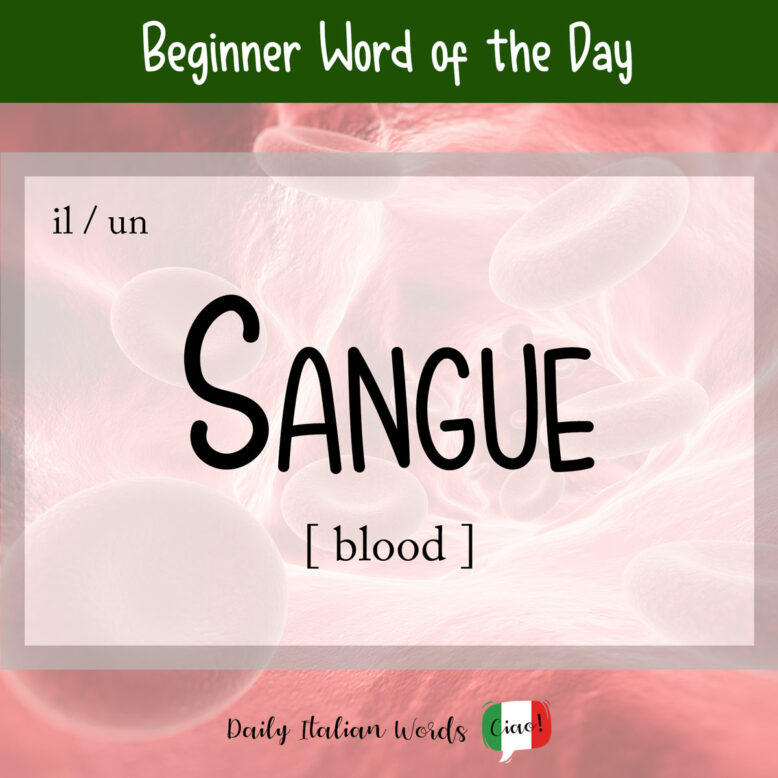The word for blood in Italian is sangue (masculine). If you have trouble remembering this term, I find it helps to think of the English word sanguine, which shares the same Latin origin (sanguis).

Below are a few verbs that are often used with sangue:
- donare il sangue = to donate blood
- sputare sangue = to spit blood
- dare il sangue = to give blood
- far scorrere sangue = to shed blood
- perdere sangue = to bleed
- succhiare il sangue = to suck blood

When describing something related to blood, the adjective sanguigno is often used instead of sangue. For example, the translation for blood group in Italian is gruppo sanguigno (although gruppo di sangue is also possible).
One of the most common medical tests people undergo in hospital is the blood test (esame del sangue). It usually involves taking a blood sample (prelievo di sangue) from a blood vessel (vaso sanguigno) in your arm.
Domani mattina devo alzarmi presto per andare a fare l’esame del sangue.
Tomorrow morning I need to get up early to go for a blood test.

Just as in English, sangue can be modified by adjectives in order to create various figurative expressions. Two good examples are sangue caldo (hot blood) and sangue freddo (cold blood) which, in addition to literally describing warm-blooded and cold-blooded animals, may also be used metaphorically. For instance, a sangue caldo is how you would say in the heat of the moment and avere il sangue caldo means to have a fiery temperament. A sangue freddo means in cold blood and avere sangue freddo means to be composed under trying or dangerous circumstances.
Since bloodshed tends to go hand-in-hand with violence, sangue is often used as a euphemism for death and violent acts, or for extreme efforts. Here are some interesting expressions:
- picchiare a sangue = to beat to death
- combattere fino all’ultimo sangue = to fight to the death
- un fiume di sangue = a massacre, slaughter
- dare / versare il proprio sangue (per qualcuno) = to sacrifice oneself (for someone)
- pagare con il sangue = to pay with one’s life
- sudare / sputare sangue = to sweat blood
I due soldati hanno combattuto fino all’ultimo sangue.
The two soldiers fought to the death.
Did you know that…?
The way you would say rare when talking about a lightly cooked piece of meat is al sangue (lit: to the blood).
In both English and Italian, you can also use the terms blood / sangue to describe family background, descent or lineage:
- fratello di sangue = blood brother
- legame di sangue = blood tie
- sangue nobile = noble blood
- sangue del proprio sangue = one’s own flesh and blood
- consanguineo = blood relation
It is from this sense of the word we get the well-known proverb Buon sangue non mente, which literally translates as Good blood doesn’t lie. It is used to talk about a person who has inherited from one or both parents a distinguishing characteristic that may be positive or negative.
Idioms and expressions with the word “sangue”
Below are a few popular expressions in which sangue makes an appearance (there are many others):
Non corre buon sangue
Literal translation: good blood doesn’t flow
English meaning: to have bad blood
Il riso / Il vino fa buon sangue
Literal translation: the laugh / wine makes good blood
English meaning: Laughter / wine is good for the soul
Farsi cattivo sangue / sangue amaro
Literal translation: to make oneself bad blood / bitter blood
English meaning: to get worked up about something
Calma e sangue freddo!
Literal translation: Calm and cold blood!
English meaning: Be cool and collected!
Cavare sangue da una rapa
Literal translation: to extract blood from a turnip
English meaning: to demand from someone something he/she cannot or won’t give (to get blood out of a stone)
Non avere sangue nelle vene
Literal translation: to not have blood in one’s veins
English meaning: to be cold-hearted
Heather Broster is a graduate with honours in linguistics from the University of Western Ontario. She is an aspiring polyglot, proficient in English and Italian, as well as Japanese, Welsh, and French to varying degrees of fluency. Originally from Toronto, Heather has resided in various countries, notably Italy for a period of six years. Her primary focus lies in the fields of language acquisition, education, and bilingual instruction.


